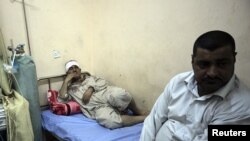One of the hallmarks of terrorism is the perpetrators’ callous disregard of the consequences suffered by the victims, who are in large part innocent by-standers. For example, in 1998, a terrorist bombing attack of the U.S. Embassy in Nairobi, Kenya, was clearly intended to inflict as much damage as possible on American citizens and property. Yet, of the 213 people killed that day, only 12 were Americans. The vast majority of the victims, including some 4000 wounded, were Kenyans.
It is time that the voices of the victims be integrated into our global counter-terrorism efforts, said U.S. Under Secretary for Civilian Security, Democracy, and Human Rights Maria Otero in her remarks at the Global Counterterrorism Forum, or GCTF, High-Level Conference on Victims of Terrorism.
“By magnifying the voices of survivors, especially through international media, we have a unique chance to educate the world about the pain inflicted by terrorists. Though such awareness is tainted with pain and suffering, it is all the more powerful in discouraging radicalized individuals and empowering other victims to speak up against violent extremism.”
The United States proposes a comprehensive strategy to address the needs of victims, and to integrate them into the global counter-terrorism effort.
The road to recovery is long and difficult. Governments should ease the way by providing access to information regarding legal, medical and other resources and services available to victims.
Second, victims are important in bringing their attackers to justice, as witnesses and advocates of accountability. They should be protected, and have the opportunity to participate in the legal proceedings.
Third, to aid in their recovery, victims should have the chance to meet other survivors to share experiences as part of the healing process.
And finally, governments must listen to victims, and give those survivors who wish to share their stories, the opportunity to do so on the world stage.
“In the aftermath of a terrorist attack, we often turn our immediate attention to the perpetrators, while traumatized victims and survivors grieve and suffer in silence,” said Under Secretary Otero. “Together with our GCTF partners, international and regional organizations, NGOs, and the media, we will ensure victims receive the respect and support they deserve, and we will advance efforts to counter violent extremism.”
Dealing With Victims Of Terrorism

The United States proposes a comprehensive strategy to address the needs of victims, and to integrate them into the global counter-terrorism effort.



